Dental Implants Midlothian
Lost a Tooth? We Can Fully Replace It!
There’s no other option for tooth replacement like dental implants. Bridges and dentures are enough to fill in the empty space in your mouth and help you chew normally again, but implants can act as a new root structure to hold your false teeth in place. That way, your smile won’t just look complete again; it will also feel and function normally, giving you a significant boost in confidence. Get in touch with our team at Long Family Dental today to set up an appointment to get started on one of the most advanced solutions for tooth replacement, including dental implants in Midlothian.
Why Choose Long Family Dental of Midlothian for Dental Implants?
- Specially Trained Dental Experts
- Entire Procedure Completed In-House
- Up to Date with the Latest Technology
What Are Dental Implants?

A dental implant is a small metal post that is typically made of titanium. It’s placed underneath the gumline directly into the jawbone where the roots of a missing tooth once were. Since titanium is biocompatible, the dental implant naturally integrates with the bone tissue, essentially replacing the missing root structure! This provides a strong, firm foundation for the custom-made restoration that covers it. One or more dental implants can be placed anywhere in the mouth to support a crown, bridge, or denture, allowing them to replace any number of missing teeth! When you rebuild a missing tooth from the roots up, the result is a smile that looks, feels, and functions just like natural.
The 4-Step Dental Implant Process
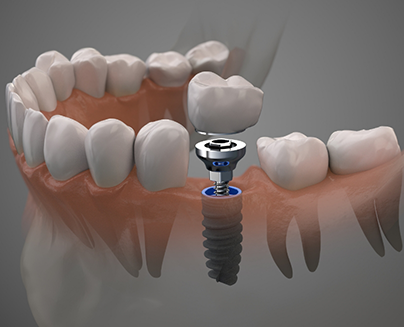
Many dental offices in and around Midlothian will refer you to a specialist to have dental implants placed before calling you back for the restoration process. At Long Family Dental, we can save you the trouble of visiting multiple dental offices by having the entire procedure done in-house! Dr. Bob and Dr. Chris have been trained to perform implant surgery and handle the restoration, so you’ll have experts that you know and trust taking care of your smile from the very beginning. You’ll also save time and money. To learn more about what to expect on this journey, click on the button below.
Initial Dental Implant Consultation

During your consultation, we'll assess your oral health and review your medical background to determine your suitability for the procedure. Should it be necessary, we'll recommend certain preliminary procedures (i.e., gum disease treatment or bone grafting) to address any underlying health problems.
Then, we'll proceed to outline the rest of your dental implant treatment. We'll carefully walk you through each step and thoroughly discuss all financial aspects.
Dental Implant Surgery

We handle the entire dental implant process at our office, eliminating the need for you to coordinate with a local specialist for any part of your treatment. Before starting the procedure, our team will administer a local anesthetic to ensure you're comfortable. Next, a small incision is made in the gum tissue to facilitate the placement of the implant posts into the jawbone. Following this, your gums are carefully closed, and protective caps are affixed over the posts for added protection.
Dental Implant Osseointegration & Abutment Placement
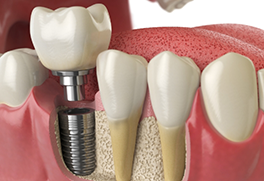
During the next three to six months, your dental implants will undergo a process known as "osseointegration," where they fuse with the jawbone. You’ll undergo a second minor surgery to have small metal connectors, termed "abutments," affixed onto the implants. These abutments serve as anchors for connecting your replacement teeth. Impressions are then taken to ensure your new crown, bridge, or denture fits seamlessly and matches your existing teeth.
Delivery of Dental Implant Restorations

Finally, you’ll return to our practice to have your replacement teeth attached. During this appointment, we'll make sure your bite is properly aligned and that you feel completely comfortable. From there, you're all set to reap the wonderful benefits of your restored, complete smile!
Benefits of Dental Implants

Unlike traditional restorations that rely on surrounding teeth or dental adhesives for support, dental implants are securely anchored into the jawbone, mimicking the natural function of missing tooth roots. This allows them to look and feel almost exactly like your natural teeth. Below, you can learn more about the benefits of dental implants that you can look forward to!
Day-to-Day Benefits

With dental implants, you can get the most out of your day-to-day life in the following ways:
- Transform Your Appearance – Your custom-made restorations will fill the gaps in your smile and match the size, shape, and color of your natural teeth.
- Enjoy All Your Favorite Foods – With your new teeth securely anchored in your jawbone, you'll regain nearly all the chewing power you had before tooth loss. You can enjoy a wide variety of delicious and healthy foods.
- Experience Greater Comfort – Unlike dental bridges and dentures, dental implants don't sit on your gums or alter healthy tooth structure. This makes them more reliable and eliminates tooth sensitivity or gum irritation.
- Renew Your Confidence – Thanks to their solid foundation in your jawbone, you'll never worry about your implants feeling loose or slipping. Smile, talk, and laugh with newfound confidence!
Health Benefits

Aside from improving your overall quality of life, dental implants can benefit your oral health. Here’s how:
- Keep Your Jawbone Strong – Dental implants are the only tooth replacement option that stimulates the jawbone like natural teeth, preventing it from deteriorating and avoiding the sunken, aged appearance that often follows tooth loss.
- Prevent Oral Health Problems – Maintaining dental implants is as simple as daily brushing, flossing, rinsing with mouthwash, and visiting your implant dentist twice a year for checkups. Their ease of care reduces the risk of oral health issues like gum disease.
- Promote Better Overall Health – The ease of maintaining dental implants encourages better oral health, which in turn supports overall well-being. People with complete smiles are less likely to face health problems such as malnutrition, arthritis, and even heart disease.
Long-Term Benefits

Dental implants are an investment that pays off in the long run. Over the years, you can enjoy the following advantages:
- Enjoy a Long-Lasting Smile – While traditional restorations like dentures and bridges typically last only 10 to 15 years, dental implants can last a lifetime with proper care, offering a durable and lasting solution for your smile.
- Live Longer – Dental implants can contribute to a longer life. Research indicates that people with 20 or more teeth at age 70 are more likely to live longer than those with fewer teeth.
- Save Time and Money – Although dental implants may have a higher initial cost compared to bridges and dentures, their longevity means you likely won't need replacements, making them a more cost-effective option in the long run.
Who Dental Implants Can Help
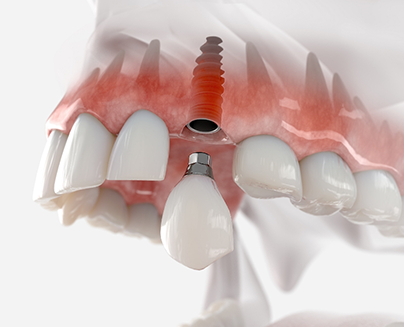
A different number of implant posts can be used to replace a specific number of teeth. From a single gap to an entire arch, there’s no amount of tooth loss so minor or so severe that dental implants aren’t a potential solution. Once we confirm that you’re a good candidate for dental implants, we will determine how many you need to regain a complete, confident smile.
Missing One Tooth
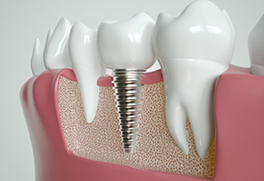
We can put a single implant post in the gap between two healthy teeth, then place an all-porcelain crown on it so that it blends in with its surroundings. This foregoes the need for making permanent alterations to the smile in order to place a bridge.
Missing Multiple Teeth
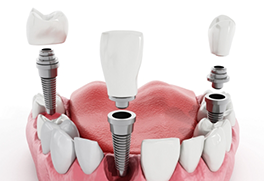
In order to replace multiple teeth at once, you’ll likely need a bridge or a partial denture. Both of these prosthetics can be supported by dental implants. Bridges typically only require two implant posts while the exact number needed for partial dentures depends on the locations of the missing teeth.
Missing All Teeth
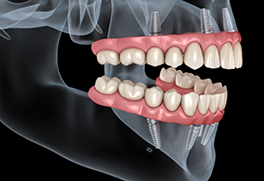
If you don’t like the idea of replacing every single tooth in a row with dental implants, don’t worry; it only takes about four to six titanium posts to anchor a full denture in place. You’ll find that dentures that use implants as artificial tooth roots are much sturdier and more reliable than traditional ones, and they also make it much easier to enjoy steak and a variety of tough foods.
Understanding the Cost of Dental Implants

The final price of dental implants is by no means set in stone. Each patient has their own needs, and we will have to personalize your treatment plan accordingly. Don’t worry; we’ll thoroughly go over the regular pricing information ahead of time so that you aren’t unpleasantly surprised later. Most of the time, dental implants will be more costly up front than other tooth replacement options. However, they can last for decades as opposed to the relatively short lifespans of bridges and dentures, so you won’t be spending money on replacements nearly as often.
I Need a Checkup & Cleaning I Am Looking for a Dentist for My Child I Am Worried About Bleeding Gums I Have a Cavity or Broken Tooth I Am Missing One or More Teeth I Want to Enhance My Smile I Am Scared of the Dentist I Have Jaw Pain I Am Worried About Sleep Apnea I Have a Dental Emergency View Our Services

